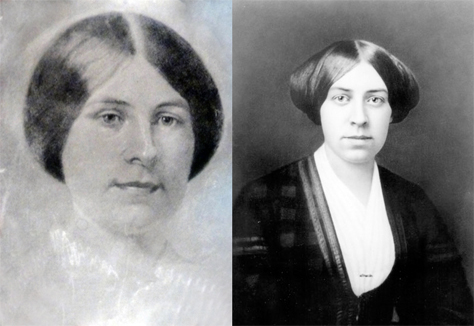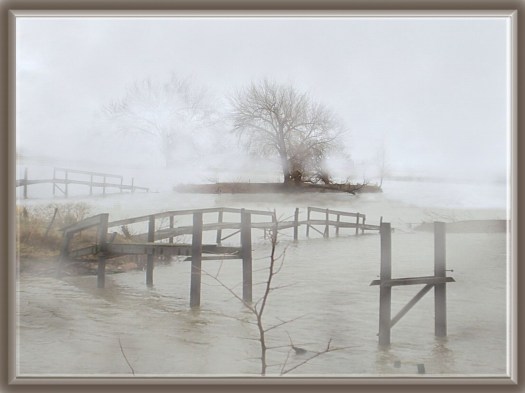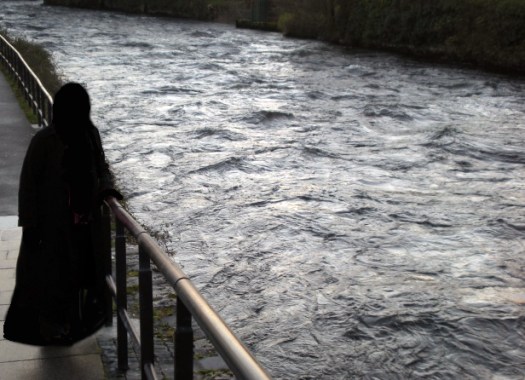We return to a discussion of Work: A Story of Experience where chapter 7, “Through the Mist” marks a turning point in Christie’s life. It is also a powerful and penetrating look inside the author who herself experienced a similar turning point.
After numerous attempts to find meaningful work that she could sustain, and after losing the one close friend she could turn to, Christie falls prey to despair:
“… she suffered a sort of poverty which is more difficult to bear than actual want, since money cannot lighten it, and th rarest charity alone can minister to it. Her heart was empty and she could not fill it; her soul was hungry and she could not feed it; life was cold and dark and she could notwarm and brighten it, for she knew not where to go.” (page 115, Work: A Story of Experience)
Close to home
It was not unlike the despair suffered by Louisa after two life-changing events in 1858 when she was 25 years old: the death of her younger sister Lizzie after a long illness, and the announced engagement of her older sister Anna just 3 weeks later.

Much emotional energy was spent on nursing her younger sister and with grief still so raw, Louisa felt a sense of betrayal at her older sister’s announcement. Plagued by a tremendous sense of loneliness, she also felt the immense burden of being the spinster caretaker of her family. Yet, filled with resolve, she set off to Boston to find work once her parents were settled in Orchard House. The search was discouraging and humiliating, ending up with one offer to sew ten hours a day in a girl’s school far removed from Boston’s enriching atmosphere and the nurturing support of family.
Memories feeding a story
Here Louisa temporarily lost heart and contemplated suicide at the Mill Dam. She mentioned the incident briefly in a letter to her parents and did not embellish on it in her journal. However, she draws on memories to describe Christie’s similar contemplation:
“Something white swept by below, – only a broken oar – but she began to wonder how a human body would look floating through the night. It was an awesome fancy, but it took possession of her, and, as it grew, her eyes dilated, her breath came fast, and her lips fell apart, for she seemed to see the phantom she had conjured up, and it wore the likeness of herself.” (page 124)
Christie’s despair
Christie’s despair came from a different scenario. After serving as companion to the mentally ill Helen (who successfully committed suicide – see previous post), she took a job as a seamstress, desiring work that would not be so emotionally demanding. She connected deeply with another woman in the group, Rachel, who had a shady past. It was the first truly satisfying relationship that Christie had had since she struck out on her own and she cherished it.
Rachel’s secret of once going astray with a man was revealed and the forewoman let her go. Indignant, Christie also left. She hoped to take Rachel in but Rachel insisted on going away to pick up the pieces of her life. Thus, Christie lost touch with her dear friend.
She took in sewing, working from her rented room. It was hard work and the isolation was especially hard on Christie.
Damning portrait of religion
 It was here that Louisa began to explore the nature of religion and spirituality of the time, and the difficulties she had experienced as noted through the character of Christie. She began, naturally, with books but was unable to find a living God within their pages. Although Louisa never mentions exactly where Christie is living, I must assume that she is thinking of Boston. Checking out the many churches in the city, Louisa’s observations proved very interesting:
It was here that Louisa began to explore the nature of religion and spirituality of the time, and the difficulties she had experienced as noted through the character of Christie. She began, naturally, with books but was unable to find a living God within their pages. Although Louisa never mentions exactly where Christie is living, I must assume that she is thinking of Boston. Checking out the many churches in the city, Louisa’s observations proved very interesting:
“Some were cold and narrow, some seemed theatrical and superficial, some stern and terrible, none simple, sweet and strong enough for humanity’s many needs. There was too much machinery, too many walls, and penalties between the Father and his children. Too much fear, too little love; too many saints and intercessors, too little faith in the instincts of the soul which turns to God as flowers to the sun. To much idle strife about names and creeds; too little knowledge of the natural religion which has no name but godliness, whose creed is boundless and benignant as the sunshine, whose faith is as the render trust of little children in their mother’s love.” (page 115)
Christie knew what she wanted: “a Father to whom I can go with all my sins and sorrows, all my hopes and joys, as freely and fearlessly as I used to go to my human father, sure of help and sympathy and love. Shall I ever find Him?” (page 116)
Bar set high
This assessment of religion is devastating. Louisa demonstrates a critical understanding of the true nature of spirituality thanks to the influence of her father’s transcendentalism, and his example when she was a child. While Bronson could be very critical of Louisa, he also showered upon her and her sisters an unusual amount of tenderness. Bronson was definitely not the father who kept an arm’s length distance like most fathers of the day. His attentions may have proven oppressive to Louisa at times as he would not accept her as she was, but he was most definitely present to her. She received much and thus, expected much.
The resolve weakens
Traditional religion thus fails Christie. She becomes ill and, unable to work, loses many of her clients. To add to her burden, her landlady demands the rent, suspecting that Christie might run out on her. Deeply stung by the accusation and lacking the money she needs to make her rent, Christie quotes a familiar phrase,
“I’ll paddle my own canoe as long as I can … and when I must ask help I’ll turn to strangers for it, or scuttle my bat, and go down without troubling anyone.” (page 120)
Hidden feelings?
Ill fortune continues to descend as one client refuses to pay for work done and another has no work for her. In her continued search, Christie witnesses a wedding and laments the unfairness of it all:
“Oh, it isn’t fair, it isn’t right, that she should have so much and I so little! What have I ever done to be so desolate and miserable, and never to find any happiness, however hard I try to do what seems my duty?” (page 123)
It’s ironic that Louisa uses a wedding to send Christie over the edge considering how she felt initially towards her sister Anna’s wedding and the sense of abandonment that followed. If one wished to read between the lines, one might even suspect a hint of envy at her sister’s happiness.
Over the edge
Her burden too heavy to bear, Christie decides to end her life. Unlike Louisa, who was able to stop herself, Christie could not resist the impulse:
“Lower and lower she bent; looser and looser grew her hold on the pillar; faster and faster beat the pulses in her temples, and the rush of some blind impulse was swiftly coming on …” (page 124)
Louisa indeed was strong to be able to resist such an impulse. She saved herself. In Christie’s case, a close friend thought long gone seized Christie’s hand and drew her to safety.
In Christie’s mind, God had intervened. And in chapter 8, a strong, supportive and soothing male voice reveals this God she so desperately seeks.
I have posted before on Louisa’s brush with suicide – you can read it here
 Click to Tweet & Share: Returning to “Work:” In and out of the mist – Louisa’s art reflects life http://wp.me/p125Rp-19j
Click to Tweet & Share: Returning to “Work:” In and out of the mist – Louisa’s art reflects life http://wp.me/p125Rp-19j
![]() Are you passionate about Louisa May Alcott too?
Are you passionate about Louisa May Alcott too?
Send an email to louisamayalcottismypassion@gmail.com
to subscribe, and never miss a post!
Facebook Louisa May Alcott is My Passion
More About Louisa on Twitter
![]() Susan’s ebook, “Game Changer” is now available From the Garret – download for free!
Susan’s ebook, “Game Changer” is now available From the Garret – download for free!





I am writing the first book from the American point of view about 19th century rotunda panoramas.These were the biggest paintings in the world,50 x 400=20,000 square feet, housed in their own rotundas which were 16-sided polygons.Chicago in 1893 had 6 panorama companies and 6 panorama rotundas.Panoramas/cycloramas were the mass medium of the 19th century.They could be rotunda panoramas or reel-to-reel panoramas,dioramas, and housed in rotundas or appearing on a stage, or small enough to be enjoyed in a parlor.I wonder whether Bronson Alcott might have considered the educational qualities of panoramas .
What an interesting question! I have no idea but I have friends who might know. I forwarded your question to them and we’ll see what they say. I’ll post it here when I hear back.
Hi – I’ve been following your blog for awhile because you’re one of the few people writing about Lizzie Alcott. I’m writing a book about Charles Ives’s Concord Sonata, and trying to figure out a statement he makes about Beth playing Scottish airs and Beethoven’s Fifth Symphony on the spinet piano that Sophia Thoreau gave the Alcott children. I can’t locate any evidence for it. If you or your readers ever run across something that indicates that Sophia Thoreau gave the Alcotts a piano, or that there was ever a spinet piano in Orchard House since it opened, I’d love to know about it. Thanks for your good work.